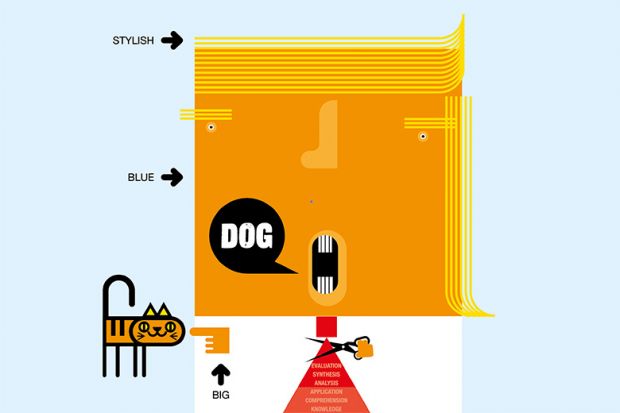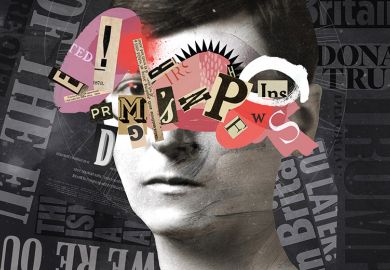For the past five years, I’ve directed a fairly unique academic programme that introduces each and every freshman at my university to critical thinking and introductory formal logic. It is widely considered to be one of the most difficult courses of the freshman year, and those of us who teach it often find ourselves on the defensive against questions such as: "Why do I – or, all too frequently, why does my child – have to take this? When will I ever need to be able to identify fallacies, or draw up diagrams of arguments, or, especially, use symbolic logic?"
My answer has often been a version of the classic “you’ll thank me later” – with the small advantage that the better students would find “later” to be no further down the road than next term.
But then came the pre-election primary season. I could practically throw a dart at cable news and say: “This is why you need to identify and understand the ad hominem fallacy. Here is why you need to understand how scientific reasoning works. That guy shows us how appeals to emotion can be so effective.”
Perhaps because of the number of candidates (or perhaps not), the Republican side of the political divide provided a lot more, let us say, “teachable moments”. Donald Trump and his surrogates were, it seemed to me, particularly guilty. They didn’t invent these manoeuvres, of course, but never in my lifetime had I observed them presented so plentifully and so shamelessly.
You don’t need to understand much about politics to understand that calling an opponent “low energy” or “little” isn’t much of an argument. My moment had arrived, and, at the end of last spring, I left for my sabbatical year fully confident that I had empowered students to identify the bad reasoning at the highest levels of power right then and right there. I swear that I could hear my students singing “bravo” as I rode off campus on my Triumph Bonneville.
But what once felt like a triumphal departure now feels like the desertion of a losing cause. How can I go back to teaching logic when its impotence has been so clearly demonstrated? How can I convince my students to do the very hard work of learning to think carefully when critical thinking has taken the most public and humiliating knockout punch of our lifetimes?
William Clifford was an English mathematician and philosopher who, in 1877, warned against a contagion and epidemic of poor thinking. Clifford argued that we are morally responsible not merely for what we do and say, but also for what we believe. We have, in fact, a positive moral duty to think critically and to base our beliefs on objectively reasonable evidence. This is because when we show ourselves to be uncritical and careless with own our beliefs, we implicitly invite others to do the same. And, perhaps more obviously, we invite others to fool us. We encourage dishonesty and deception. Each time we believe something that we lack the right to believe, in other words, we spread an intellectual and moral disease: an epistemic shamelessness that threatens the very possibility of meaningful, rational discourse.
When we share fake news on Facebook, we encourage its production and dissemination. When we are seduced by ad hominem attacks, “pivots” away from the topic at hand or bogus poll data, we invite more of the same. As we become accustomed to presidential staff turning black into grey and the false into the less false, these habits seep into our everyday discourse with friends and family.
Eventually, of course, the envelope is pushed too far and we witness the most influential people in the world breaking free of all fetters previously imposed by reason or reality, presenting verifiably false claims as “alternative facts”. And when we no longer feel any shame in saying with a straight face what we know many of our listeners know to be untrue, civil society is imperilled. We are, to borrow again from Clifford, on the brink of savagery.
A primary lesson learned from the darkest hours of the 20th century is that it is up to each of us to identify and confront the immoral in all its forms. Among the most pernicious and perilous immoralities of our own age is our apparent surrender to the lowest standards of belief and communication. And the antidote to this malady is clear: we must teach our students, our friends and our families to hold themselves morally accountable for their beliefs no less than their words or actions.
So now, perhaps, my moment really has arrived. But it will take tens of thousands of us to really make a difference and drag our civil discourse back from the brink. Should all freshmen across the land be required to study critical thinking and symbolic logic? It is a thought. Calling for it might make me the least popular professor in the country – but they would surely thank me for it later.
Michael Ventimiglia is an associate professor in philosophy at Sacred Heart University, Connecticut.
POSTSCRIPT:
Print headline: Trump and logic’s limits
Register to continue
Why register?
- Registration is free and only takes a moment
- Once registered, you can read 3 articles a month
- Sign up for our newsletter
Subscribe
Or subscribe for unlimited access to:
- Unlimited access to news, views, insights & reviews
- Digital editions
- Digital access to THE’s university and college rankings analysis
Already registered or a current subscriber?







